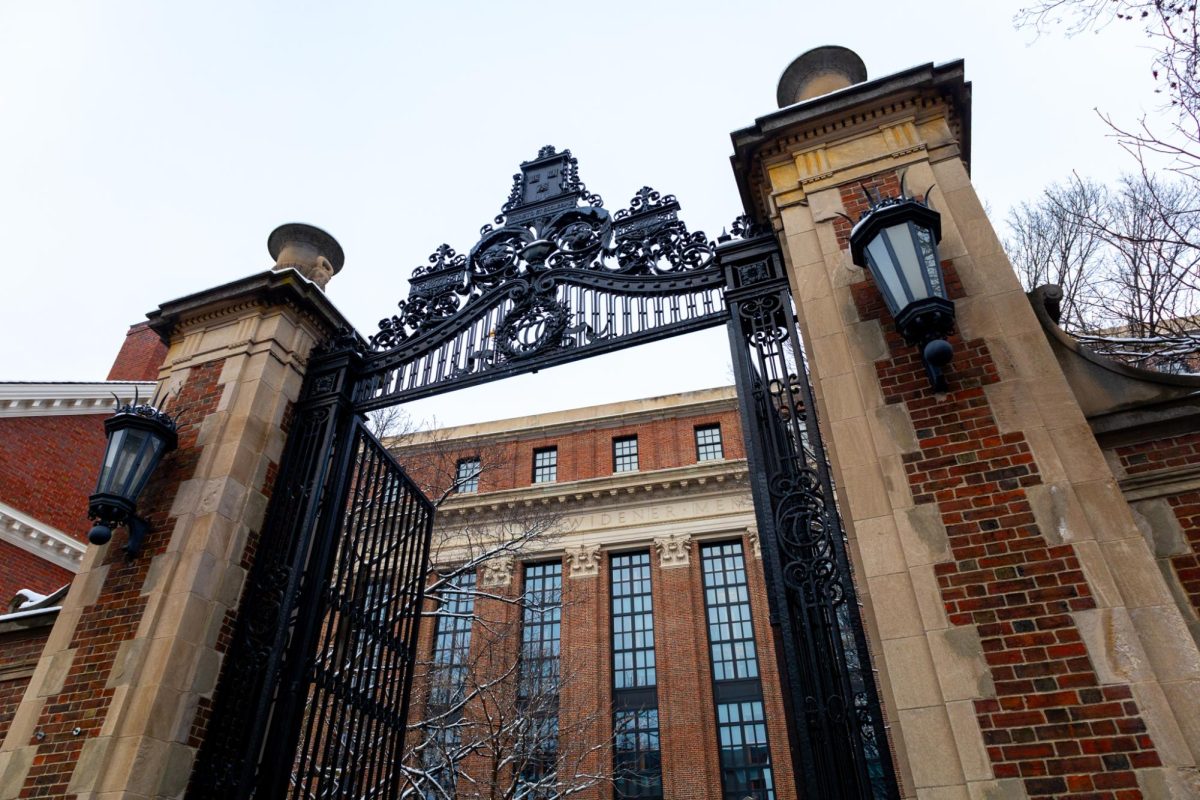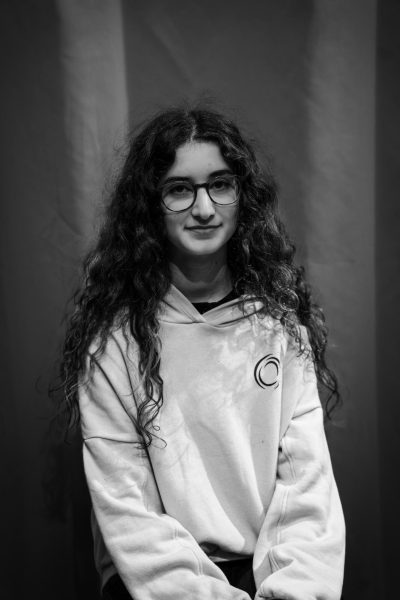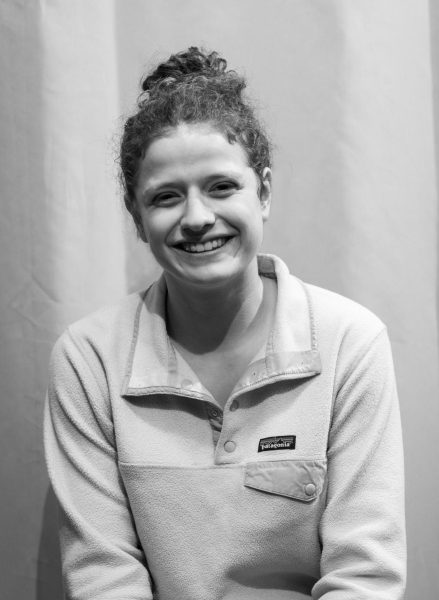A grandmother, gray-haired and laughing, spinning in circles around a toddler in a pink dress. Her name is Judi Weinstein Haggai, she is 70 years old, and she is a hostage. A grandfather, squinting through glasses to read the newspaper, shirt buttoned and slacks belted. His name is Amiram Cooper, he is 85 years old, and he is a hostage. A father, burrowing his head into his giggling baby’s arms. His name is Yarden Bibas, his wife’s name is Shiri Bibas, and they and their four year old son, Ariel Bibas, and ten month old baby, Kfir Bibas, are all hostages of Hamas in Gaza.
This video was screened at a Harvard Hillel event on Monday, November 27, where five Israelis whose family and friends were hostages in Gaza had gathered to speak. By the end of the video, both the speakers’ and the audiences’ eyes were red. After the moderator, Rabbi David Wolpe, introduced the guests—Hodaya Abu, Orel Roa, Adva Gutman Tirosh, Itai Raviv, and Roni Raviv—the crowd stood up and gave them a standing ovation, before they had even said a word.
When they did speak, beginning with Abu and Roa, the room fell silent. “He’s an electrical engineering student. He’s supposed to start his third year in a week,” Abu said, describing Ofir Tzarfati, one of her and Roa’s best friends. “But he won’t do it, because he’s a hostage right now.”
October 6th was Ofir’s 27th birthday, and he spent it at the Nova festival, celebrating with his friends and eating a cake that his niece had made especially for him. “He loves to celebrate life,” Roa said. “And he always thinks about others before he thinks about himself.”
Ofir was out until about 6:30 am, when he and his friends first heard the sounds of bombs and rockets, and realized that they had to leave the area. The roads were too packed for cars to move anywhere, and so for four hours Ofir and his girlfriend Shoval hid in the open field. Everyone around them was screaming. Their only hope for survival was to find a wide enough tree, and hope that they wouldn’t be spotted.
Somehow, the three lasted long enough for a rescue car to reach them. However, there was no room for Ofir, except in the trunk, which was filled with expensive camera equipment that he didn’t want to break. “Go without me,” he insisted. When a second rescue car came, Ofir called Shoval. “Everything is okay, we are out of there,” he told her. “We’re good.” A few minutes later, the car was attacked by Hamas terrorists. That was the last time that Shoval heard from Ofir.
Yet, Abu and Roa were confident that Ofir was safe. “We’re very connected to him, and so we can actually feel his heartbeat,” Abu said. “We are clueless,” Roa added, “but full of hope.” That same day, November 27, the Israeli Defense Force (IDF) declared that Ofir was confirmed dead.
Adva Gutman Tirosh also lost a family member to terrorists at the Nova festival — her sister, Tamar Gutman. “Tamar was 27 years old. She was a law student and an amazing person,” Tirosh began, her voice quiet and breaking. “Sorry,” Tirosh apologized to the audience. “I tried.”
After making her family dinner, and bringing it to their respective rooms, Tamar had left to go to the Nova festival with her best friends from high school on October 6th. When Tirosh woke up to missile alarms on October 7th, Tamar was the first person she thought of. “Come back home,” she messaged her. “I can’t,” Tamar said. Tamar told Tirosh that there were terrorists surrounding all of the roads, and that people were telling her to stay put.
“Open a map, look where you are, and stay away from the crowd,” Tirosh told her. “Let’s see if you can go on foot somewhere.”
“Okay,” Tamar said. “Everything is okay, and I will let you know when we’re coming back home.”
She sent that message at 7:30 am. It was the last message she ever sent. For 27 days, Tirosh didn’t know what had happened to her sister. She was a doctor, and so she searched hospitals, asking patients if they had seen her; asking them what happened during the Nova festival. She found nothing but horror. It took the IDF 27 days to confirm Tamar’s death because her body had been burned and dissected. “They couldn’t find all her organs and all her bones. They couldn’t find the skull,” Tirosh said. “We have a little bit of what’s left from her.”
Itai and Roni Raviv, who spoke last, were the only ones with family members who have been released. The weekend of October 7, Ruti and Avraham Munder, the Ravivs’ great-aunt and uncle, were with nine-year-old Ohad Munder, their only grandson, and his parents, Keren and Roi Munder, to celebrate the Jewish holiday Simchat Torah. The Ravivs lost connection with them all at around 10 am that Saturday. It took them time to realize the gravity of the situation — Israelis are used to bombings, and so they didn’t think it was a big deal at first. “The power must be out,” they thought. Roni, a pediatrician, soon found out how brutal the attacks really were. “The looks I saw on people’s faces, the stories that they told us of people hiding behind bodies, of people that had been wounded for hours who just had to lie down and play dead—” she paused. “The look on their face is something that I’ll never forget.”
The Ravivs soon found out that their own family had been taken hostage by Hamas. And after another two weeks, they were notified that Roi had been murdered. His body was found next to his house, which was burned to the ground, and he was buried without any of his close family. “It was horrible,” Itai said.
Still, there was one bright spot among the many dark ones—three days before the Harvard event, on November 24th, Ohad, Ruti, and Keren were released. For the Ravivs, this was huge. “I’ve been telling this story for so long, but now I’m doing it with a smile and some sort of relief,” Itai told the crowd. “Now, the important thing is,” he added, “and why I think it is important for me to speak to you as well, is to remember that there are still people over there.” The Ravivs’ great uncle, for one, 78 year old Avraham, is still in captivity.















